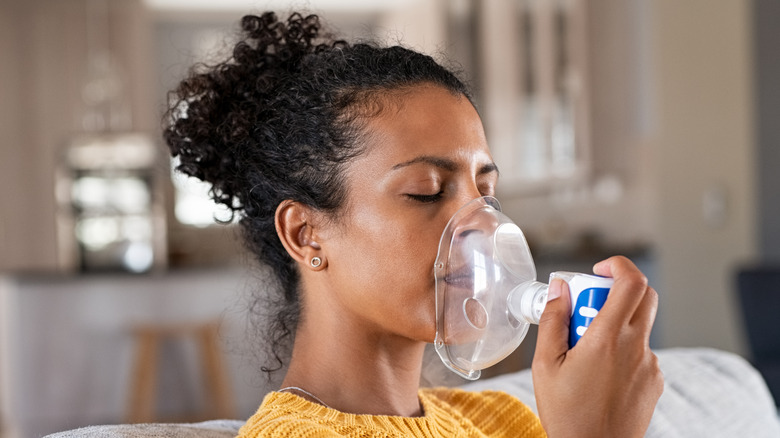The Best Time Of Day To Use Your Inhaler, According To Science
The number of Americans diagnosed with asthma continues to grow. According to the Centers for Disease Control and Prevention (CDC), nearly 20 million adults in the U.S. over the age of 18 experience asthma, in addition to 5.1 million youth under the age of 18 (via the Asthma and Allergy Foundation of America). Asthma is a medical condition that impacts our ability to breathe. When our airways are constricted, it limits oxygen flow to the lungs, causing symptoms such as wheezing, coughing, or chest pressure.
An asthma attack can be prompted by a number of stimuli, ranging from the biological to the environmental (via the Mayo Clinic). Some people may experience an episode brought on by cold weather, certain food items, exercise, stress, or environmental irritants, such as mold, pet fur, pollen, or even cockroach excrement. While there is no cure for the condition, certain treatment methods, such as the use of inhalers, can provide relief from symptoms.
How do inhalers work?
Inhalers, otherwise known as bronchodilators, use steroid medications to reopen the airways to allow the flow of oxygen (via Charleston Allergy & Asthma). Sprayed and inhaled through either the nose or mouth, there are 3 different kinds of inhalers one can use. The first is a metered-dose inhaler (MDI), which utilizes pressure to administer the medication. Nebulizers are administered as a mist that's taken in through a face mask or tube, and last are dry powder inhalers (DPIs), which require a sharp intake of the medication through inhalation.
A 2018 study published in Annals of Allergy, Asthma & Immunology involving over 1,000 participants found that the optimal time of day for one-dose inhaler use is in the evening. With a little over 600 patients in both the morning and evening user groups, lung efficiency proved slightly better in the evening than doses administered in the morning hours.
When it comes to the use of any kind of medication, however, be sure to always consult with your doctor regarding how to take them based on your specific health needs.


